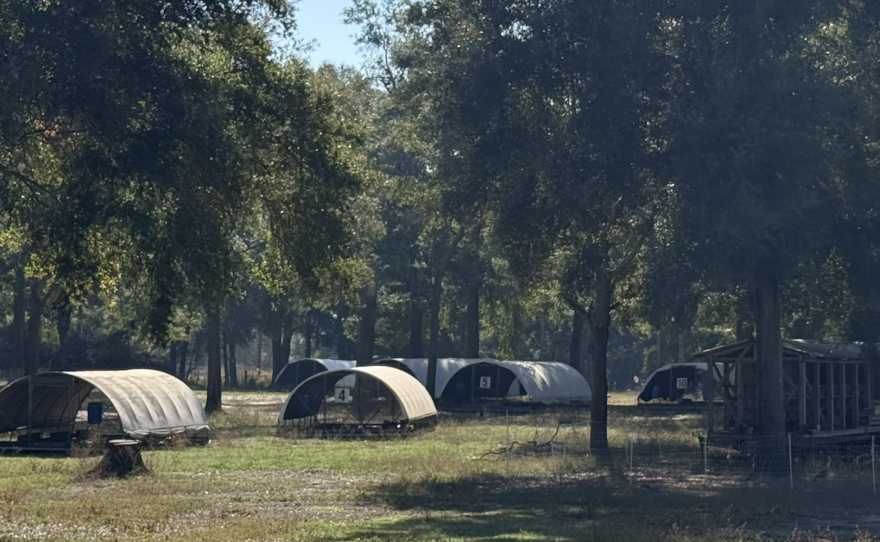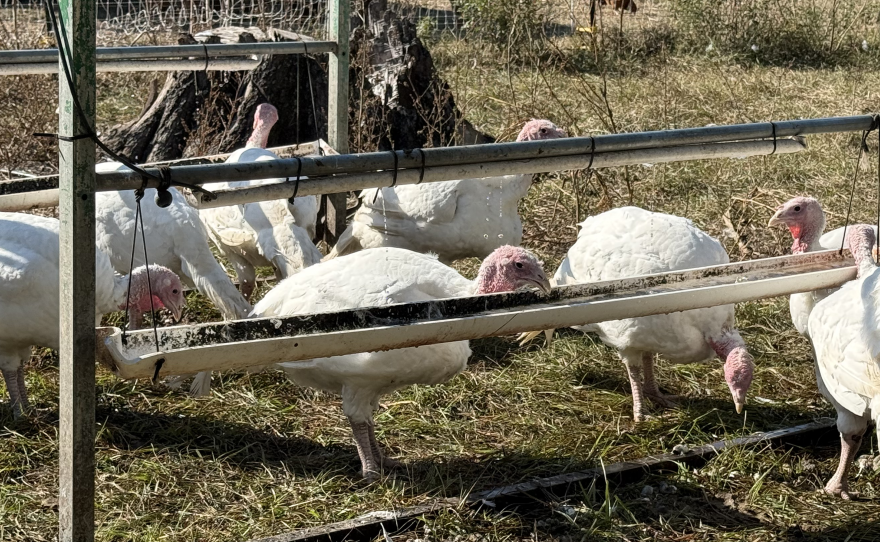Thanksgiving has a reputation for being a relaxing transition between two of the year’s most anticipated holidays.
But for people in the poultry business, this easy-going perception isn’t on the table. Local poultry farms have been prepping for their busiest season of the year since spring.
“This is the week where we lose feeling in our arms handling a lot of these turkeys,” said Dave Shields, one of the owners of Pastured Life Farm in O’Brien, Florida.
Pastured Life Farm processes several hundred turkeys during its Thanksgiving harvest and a total of about 15,000 birds each year. The farm is located on about 40 acres and leases an additional 60 acres.
Shields and his wife, Ginger, are first-generation farmers who operate year-round with their six children ready to lend helping hands. Dave Shields used to work in IT, but the 2008 housing crisis and the drive to produce healthy food played a role in the family moving from Jacksonville.
The Shields family journey began as consumers, then homesteaders and eventually pasture-based producers.
The family has opearted the farm for about 15 years, building a loyal customer base.
The turkeys have large areas to range freely to mimic natural grazing. Turkeys are natural foragers that graze on a diverse diet of plants, seeds, and insects.
“The whole concept of that is that our chickens are always going to be on the move,” said Dave Shields. This system allows manure to spread with little effort.
“They're going to be on fresh ground every day in the sun, and we're trying to keep them comfortable, happy, no stress and, of course, in a natural environment, something that they'd be more akin to, you know, natively.”
Keeping the turkeys in motion rather than moving their waste shortens the process, eliminates effort and minimizes diesel consumption, he added.
Ginger Shields said that the farm does not believe in any animal existing in the same square footage of land for the remainder of its lifespan.
“Pasture poultry is all about mobility,” said Dave
Pastured Life Farm falls under the PL 90-492 poultry exemption, an amendment to the 1968 Poultry Products Inspection Act that allows small farms to process and sell poultry without continuous USDA inspection, so long as they stay under the 20,000-bird limit and follow the sanitation and record-keeping requirements. This permits operations without the need for costly federal inspection.
Dave Shields said that small-scale farming enables them to handle the birds individually and ensure they are well cared for, prioritizing a humane harvest.
Thanksgiving season starts off with a drive to West Virginia, where the year’s flock is picked up when they are 1 day old.
The chicks spend about four weeks in brooders before being placed in mobile field shelters for eight weeks. When fully grown, they graze in a movable, netted paddock, typically around one acre in size.
This special breed of turkey keeps its white plumage, as colored feathers can stain the poultry’s skin.
Once the birds reach maturity, the two-day harvest process begins, said Dave Shields. They are then packaged and kept at a cool temperature before preordered birds are delivered to local neighborhood drop points and farmers markets.
“They'll be one of the very few actual fresh birds you'll be able to get on Thanksgiving,” he said.
Dave Shields said he loves the turkeys. When they are raised humanely, they can be a lot of fun to be around, he added.
Pastured Life Farm is a proud member of the American Pastured Poultry Producers Association (APPPA), a non-profit trade organization that encourages pasture-raised poultry. The group provides resources such as technical insights, regional networking and informed discussions.
Dave Shields credits the organization for the farm's growth. After the association’s executive director resigned last year after serving 12 years, Ginger Shields picked up the torch, assuming a major role in maintaining the association’s mission.
She too credits the association with helping them move from a “homestead side hustle” to a viable, well-equipped business.

“APPPA has really helped us in networking with other producers around the country that were doing it already,” she said, adding that the association helped them shorten the learning curve in a lot of ways.
Ginger Shields said she views her role in the association to build the pasture farm community by emphasizing Pastured Life’s commitment.
Dave Shields said those who purchase from the farm are more than customers; they are supporters and patrons. He described small-scale farming as a “community-based trade” where he comes to know his customers’ preferences.
Katherine Graci, a regular buyer from Jacksonville said she discovered Pastured Life online years ago. She said she appreciates buying quality products directly from their source.
“You know, there are many days where you work hard, hard, hard, and it's after midnight or whatever and you're just completely exhausted,” said Dave Shields. “And then you get this beautiful message from a customer that just tells you how much their life has changed from eating nutritious food.”
Ginger Shields stresses the importance of understanding that the majority of consumed meat and poultry is a muscle. Stagnant animals that are not pasture-raised have a high risk of producing atrophied meat. Atrophy occurs when muscles are underused, leading to weaker and less developed meat.
“It's really important to have animals that are moving around and exercising and using those muscles because it's going to result in a higher quality protein,” she said.
The flocks at Pastured Life do not require steroids, antibiotics and growth-influencing pharmaceuticals to produce viable meat, a common practice in factory settings, said Ginger Shields.
Many of these housed birds have their beaks and snoods (the flap of skin hanging from their forehead over their beaks) trimmed, and some get their spurs and talons removed.
“These turkeys look like turkeys. They act like turkeys,” she said. “They get to scratch and just bathe and chase grasshoppers and do all the things that turkeys do.”

At Pastured Life, the Shields support transparency as a core value in all aspects of their business by giving consumers the opportunity to know everything about the production process and how the birds are handled.
Customers like Stephanie O’Neal, said they trust Pastured Life’s products more than the selection at big-name grocery stores.
O’Neal, Ginger Shield’s sister, has seen the farm’s progress from its beginning.
“I mean, it's a true family-owned business, and they had a dream and they ran with it,” she said.
She aims to secure products from the farm as often as possible, and said the turkey’s brine tastes much better than its grocery-store counterpart, especially with Ginger Shield’s recipes available on Pastured Life’s website.
“Every year now, I try to get a turkey from them. It's completely different than your Butterball turkey that you would find at, like a Publix or Walmart,” she said.
O’Neal, who is battling cancer, said she aims for the healthiest food possible, relying on the farm’s chicken and eggs raised without additives.
“Everything that they're doing is for a healthier, more sustainable lifestyle, for their…not just their family, but all of their customers,” she added.
Dave Shields said he loves to farm with his family, and finds it rewarding to see his children mature in this environment. Ginger Shields said she looks forward to passing on the business to their children.
The farm’s growth is gratifying, she said, and their efforts are recognized by consumers acknowledging the previous disconnect from food sources.
“There are more people that are now seeking a connection with their food. We have been on a tremendous growth curve,” she explained.
The farm is planning several expansion projects, and its future is headed for greener pastures, especially with the success of this Thanksgiving season.
“You know, we enjoy doing this,” said Dave Shields about the holiday. “It's a very meaningful harvest.”



